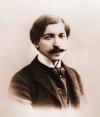Biography
Pierre Louÿs (December 10, 1870 - June 6, 1925) was a French poet and writer, most renowned for lesbian and classical themes in some of his writings.
Pierre Louÿs was born Pierre Louis on December 10, 1870 in Ghent, Belgium, but moved to France where he would spend the rest of his life. He studied at the École Alsacienne in Paris, and there he developed a close friendship with a future Nobel Prize winner and champion of homosexual rights, André Gide. In the 1890s, he became a friend of the noted English dramatist and homosexual, Oscar Wilde. Although heterosexual, Louÿs enjoyed entree into homosexual circles. Louÿs started writing his first erotic texts at the age of 18, at which point he developed an interest in the Parnassian and Symbolist schools of writing.
In 1891, Louÿs helped found a literary review, La Conque, where he proceeded to publish Astarte--an early collection of erotic verse already marked by his distinctive elegance and refinement of style. He followed up in 1894 with another erotic collection in 143 prose poems--Songs of Bilitis (Les Chansons de Bilitis), this time with strong lesbian themes. It was divided into three sections, each representative of a phase of Bilitis's life: Bucolics in Pamphylia, Elegies at Mytilene, and Epigrams in the Isle of Cyprus; dedicated to her were also a short Life of Bilitis and three epitaphs in The Tomb of Bilitis. What made The Songs sensational is Louÿs' claim that the poems were the work of an ancient Greek courtesan and contemporary of Sappho, Bilitis; to himself, Louÿs ascribed the modest role of translator. The pretense did not last very long, and "translator" Louÿs was soon unmasked as Bilitis herself. This did little to tarnish The Songs of Bilitis, however, as it was praised as a fount of elegant sensuality and refined style, even more extraordinary for the author's compassionate portrayal of lesbian (and female in general) sexuality.
Some of the poems were tailored as songs for voice and piano. Louÿs' close friend Claude Debussy composed a musical adaptation Chansons de Bilitis (Lesure Number 90) for voice and piano (1897-1898) in three parts:
* La flûte de Pan: Pour le jour des Hyacinthies
* La chevelure: Il m'a dit «Cette nuit j'ai rêvé»
* Le tombeau des Naiades: Le long du bois couvert de givre.
In 1955, one of the first lesbian organizations in America called itself Daughters of Bilitis, and to this day Louÿs' Songs continues to be an important work for lesbians.
In 1896, Louÿs published his first novel, Aphrodite--Ancient Manners (Aphrodite (m?urs antiques)), a depiction of courtesan life in Alexandria. It is considered a mixture of both literary excess and refinement, and, numbering at 350,000 copies, was the best selling work by any living French author in his day.
Louÿs went on to publish Les Aventures du roi Pausole (The Adventures of King Pausolus) in 1901, Pervigilium Mortis in 1916, both of them libertine compositions, and Manuel de civilité pour les petites filles à l'usage des maisons d'éducation (written in 1917, published posthumously and anonymously in 1927),a parody whose obscenity is almost unparalleled even in the long history of French clandestine publishing.
Even while on his deathbed, Pierre Louÿs continued to write delicately obscene verses. ..






